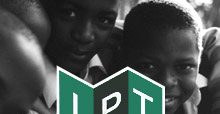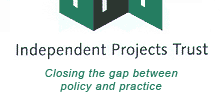
Independent Projects Trust
Doing The Right
Thing : IPT, Effective Schools And
Education For Democracy
Clive Harber Professor of Education University of Natal Durban
IPT concentrates on conflict resolution, peace and education for democracy and a major focus of this work is on education for peace and democracy in schools. It is right to do so and in this article I shall suggest why education for democracy in schools is so important both in South Africa and in Africa as a whole. I shall argue that the only truly effective school is one that educates for democracy. There are two main reasons for this. The first concerns the relationship of education with the broader political system and the second concerns the internal efficiency of organising a school democratically.
Any discussion of what makes an effective school must ask the question - effective at what? What sort of person and what sort of society should the effective school aim to help to produce? Globally, since the end of the cold war, the answers to these questions have increasingly been in terms of democratic and political systems and individuals possessing democratic values. The United Nations, for example, defines development as a process of enlarging people's choices, a key element of which is political freedom and guaranteed human rights. Debates about democratisation are also clearly on the political agenda again in Africa in the 1900s after decades of one party and military rule. Between 1990 and 1994 41 out of 47 countries in sub-Saharan Africa underwent some measure of political liberalisation, though only a minority could be considered to have a minimally democratic regime while others have experienced transitions which are flawed or blocked. South Africa itself, despite various constitutional and regional problems, is now fully committed to a democratic political system.
In the resent past Africa has been wracked by war which has caused enormous damage to the economies, social fabric and educational provision of many countries. In democracy lies the best hope for the peaceful solution of disputes and conflicts. Authoritarian governments have been marked by civil unrest, violent repression and wars against neighbours. While democracies are not perfect, accountable and representative government minimises internal violence and the abuse of human rights and greatly decreases the possibility of going to war without good reason. Democracy can therefore help to provide a peaceful context in which schools can at least function safely. Education for peace and democracy is consequently of fundamental importance in judging school effectiveness in the Africa context in which schools can at least function safely. Education for peace and democracy is consequently of fundamental importance in judging school effectiveness in the African context and elsewhere. Good accounting, registration and assessment systems are all meaningless if the school is being shelled from the nearest hill or where teachers and students are being arrested for subversion'.
However, the skills, values and behaviours associated with democracy and peaceful conflict management are not inherited genetically, they are learned socially. Schools must contribute to the development of a political culture supportive of democracy if they are to be effective in terms of the goals that schools should achieve. This implies not only a minimum level of knowledge about the political system but also the envelopment of political skills such as detecting bias, arguing a case and participating in group decision-making. However, it is important to remember that democracy is not just about participation but, more importantly, about how participation takes place. Participation rates were high in the Soviet Union and Nazi Germany but this did not make them democracies. There are important procedural values underlying democracy which education must foster and encourage such as tolerance of diversity and mutual respect between individuals and groups, a respect for evidence in forming opinions, a willingness to be open to the possibility of changing one's mind in the light of such evidence and regarding all people as having equal social and political rights as human beings.
Any school that is to promote such values must involve some shift of power and authority from staff to students, both in terms of what is learned in the classroom and how. In terms of school organisation this means some sort of elected school council which represents staff, students and parents as is now being proposed in legislation in South Africa. The powers of such a council will vary according to the ages of the students but must include matters which are of importance to them. In terms of curriculum and classroom method, the democratic school is one where students can have some real power over curriculum because there is some genuine choice and student initiative involved. Teaching and learning in such a situation will be characterised by a variety of teaching methods which regularly include those such as discussion and projects where the students are themselves influential in shaping the direction the work takes, although it will also include traditional teacher-led instruction. This is because democracy requires a mixture of passive and active behaviours. It needs individuals with the abilities to participate actively and to learn independently but also to sit and listen quietly to teachers and other students and to obey rules that have been democratically agreed on.
The second major reason why a democratic school is a more effective school lies with internal school organisation and management. There are four reasons for this:
- Rules are better kept by staff and students if democratically agreed to in the first place.
- Communication in the school are improved through regular discussion.
- There is an increased sense of responsibility as staff and students have more control over their organisation.
- Decision-making is improved as a range of internal and external interests and opinions are considered.
Indeed study of school effectiveness that have used indicators such as examination results and truancy rates have found that effective school management is related to staff having a sense of control over the school programme and worthwhile and efficient inter-departmental meetings and planning exercises. This sense of involvement and influence in the institution is also true of students. A favourable school climate has been linked with students sensing that the school as a social system is not a meaningless environment in which they can exert little control over what happens to them. Moreover, in Africa where schools, especially in rural areas, are often plagued by conditions of financial stringency and poor resourcing, there is evidence that student involvement can help enhance school-effectiveness-or in some cases reduce ineffectiveness. Perhaps most importantly of all, a number of studies have indicated that democratically organised schools do indeed contribute to the development of both participatory skills and the values of operating democratically, including significantly better inter-ethnic relationships and reduced incidents of violence.
These arguments for democratic education and the evidence that supports them have been reinforced in a number of African countries by experimentation with democratic school organisation during the struggle for independence. Two examples of such countries which are now attempting to implement more nationwide democratic forms of education are Namibia and Eritrea. However, in terms of population both of these are relatively small countries and such initiatives are primarily government sponsored. In South Africa, on the other hand, although the government is committed to more democratic forms of education, the scale of what must be achieved is much greater and the state alone is less likely to be able achieve the necessary democratic transformation of education without some help from the NGO sector. This is why the work of the IPT is important in South Africa and why as time goes on information on its aims and practices should also be available to those outside South Africa who are committed to more democratic relationships in education.


